“Healing is possible when, wounded and repentant, we allow ourselves to be forgiven by Jesus”
Holy Chrism Mass
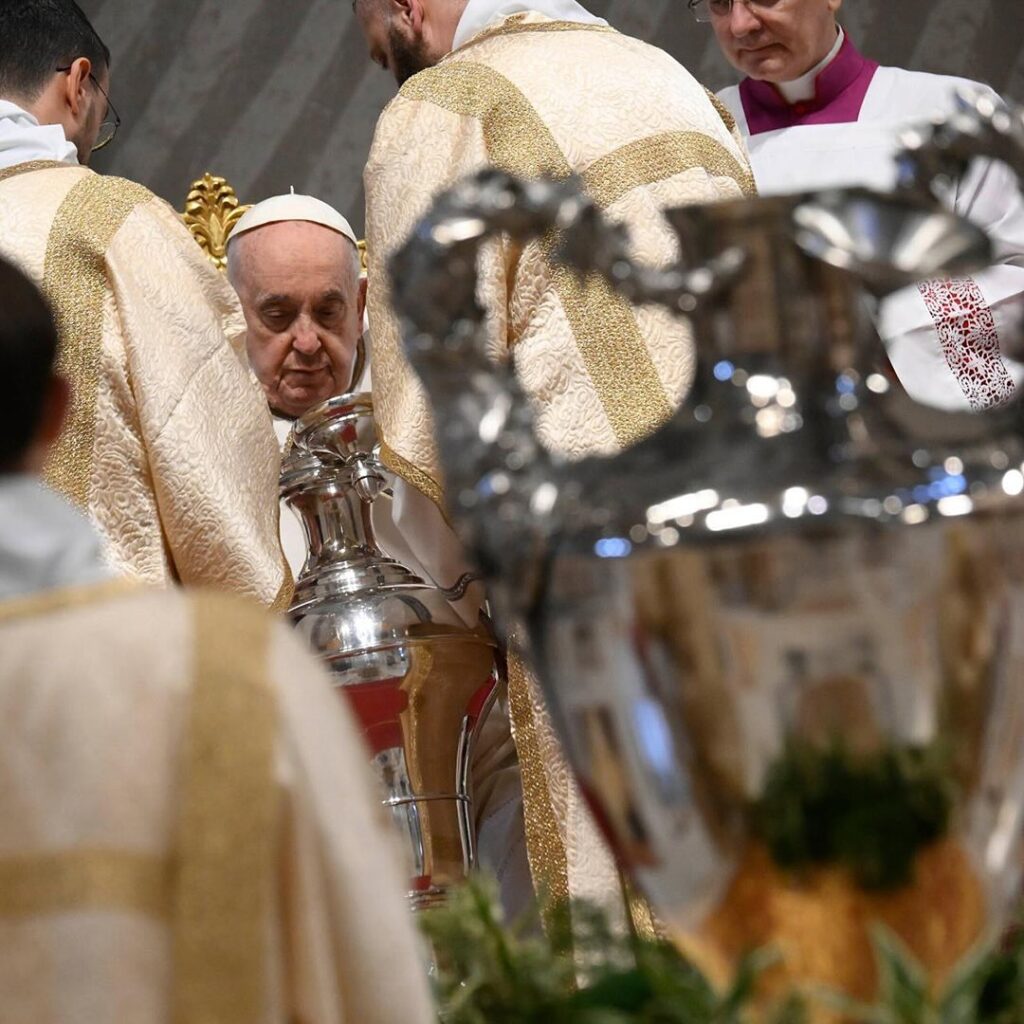
At 9:30 this morning, the holiday of Holy Thursday, the Holy Father Francis presided over the Chrism Mass in the Vatican Basilica, a Liturgy that is celebrated on this day in all Cathedral Churches.
During the Eucharistic Celebration, the priests renewed the promises made at the time of Sacred Ordination; Then the blessing of the oil of the sick, the oil of the catechumens, and the chrism took place. “Thank you, dear priests, for your open and docile hearts; thank you for your fatigue and your tears, thank you for bringing the wonder of God’s mercy to the brothers and sisters of our time,” said the Holy Father
Below, we publish the Homily that the Pope delivered after the proclamation of the Holy Gospel:
***
Homily of the Holy Father
“The eyes of all in the synagogue were fixed on him” (Lk 4:20). This passage of the Gospel is striking. It always makes us imagine that moment of silence when every eye was on Jesus, in a mixture of wonder and hesitance. We know, however, what happened next. After Jesus had unmasked the false expectations of his townspeople, they were “filled with rage” (Lk 4:28), got up and drove him out of town. They had indeed looked upon Jesus, but their hearts were not prepared to change at his word. They lost the occasion of a lifetime.
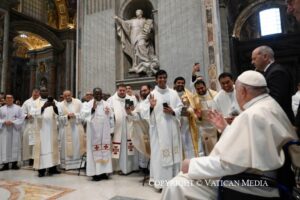 Tonight, Holy Thursday, will offer us a very different exchange of looks. It involves Peter, the first Pastor of our Church. Peter too initially refused to accept the “unmasking” words that the Lord had spoken to him: “You will deny me three times” (Mk 14:30). As a result, he “lost sight” of Jesus and denied him at the cock’s crow. Then, however, “the Lord turned and looked at Peter” and he “remembered the word of the Lord… and went out and wept bitterly” (Lk 22:61-62). His eyes were flooded with tears that, rising up from a wounded heart, liberated him from his false notions and his self-assurance. Those bitter tears changed his life.
Tonight, Holy Thursday, will offer us a very different exchange of looks. It involves Peter, the first Pastor of our Church. Peter too initially refused to accept the “unmasking” words that the Lord had spoken to him: “You will deny me three times” (Mk 14:30). As a result, he “lost sight” of Jesus and denied him at the cock’s crow. Then, however, “the Lord turned and looked at Peter” and he “remembered the word of the Lord… and went out and wept bitterly” (Lk 22:61-62). His eyes were flooded with tears that, rising up from a wounded heart, liberated him from his false notions and his self-assurance. Those bitter tears changed his life.
Jesus’ words and actions in the course of those years had not altered Peter’s expectations, so similar to those of the people of Nazareth. He too was expecting a political Messiah, powerful, forceful and decisive. Scandalized at the sight of Jesus, powerless and submitting passively to his arrest, he said, “I do not know him!” (Lk 22:57). How true that was: Peter did not know Jesus. He would only begin to know him when, at the dark moment of his denial, he yielded to tears of shame and tears of repentance. And he would know Jesus in truth when, “hurt because Jesus said to him a third time, ‘Do you love me?’”, he would let the Lord’s gaze penetrate his entire being. Then, from saying, “I do not know him”, he was able to say, “Lord, you know everything” (Jn 21:17).
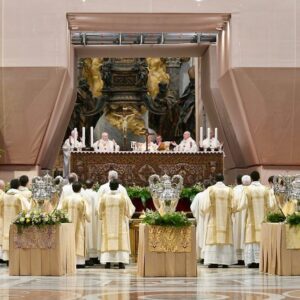 Dear brother priests, the healing of the heart of Peter, the healing of the apostle, the healing of the pastor, came about when, grief-stricken and repentant, he allowed himself to be forgiven by Jesus. That healing took place amid tears, bitter weeping, and the sorrow that leads to renewed love. For this reason, I have felt the need to share with you a few thoughts on an aspect of the spiritual life that has been somewhat neglected, yet remains essential. Even the word I am going to use today is somewhat old-fashioned, yet well worthy of reflecting on. That word is compunction.
Dear brother priests, the healing of the heart of Peter, the healing of the apostle, the healing of the pastor, came about when, grief-stricken and repentant, he allowed himself to be forgiven by Jesus. That healing took place amid tears, bitter weeping, and the sorrow that leads to renewed love. For this reason, I have felt the need to share with you a few thoughts on an aspect of the spiritual life that has been somewhat neglected, yet remains essential. Even the word I am going to use today is somewhat old-fashioned, yet well worthy of reflecting on. That word is compunction.
The origin of the term has to do with piercing. Compunction is “a piercing of the heart” that is painful and evokes tears of repentance. Here, another episode from the life of Saint Peter can help us. His heart having been pierced by Jesus’ gaze and his words, Peter, now purified and set afire by the Holy Spirit, proclaimed on the day of Pentecost to the inhabitants of Jerusalem: “God has made him both Lord and Messiah, this Jesus whom you crucified” (cf. Acts 2:36). His hearers, recognizing both the evil that they had done and the salvation that the Lord was offering them, were themselves “cut to the heart” (Acts 2:37).
That is what compunction is: not a sense of guilt that makes us discouraged or obsessed with our unworthiness, but a beneficial “piercing” that purifies and heals the heart. Once we recognize our sin, our hearts can be opened to the working of the Holy Spirit, the source of living water that wells up within us and brings tears to our eyes. Those who are willing to be “unmasked” and let God’s gaze pierce their heart receive the gift of those tears, the holiest waters after those of baptism. [1] This is my desire for you, dear brother priests.
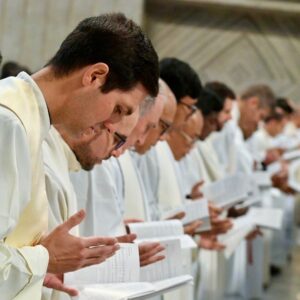 Yet we need to understand clearly what it means to weep for ourselves. It does not mean weeping in self-pity, as we are so often tempted to do. As, for example, when we are disappointed or upset that our hopes are frustrated, when we feel misunderstood, perhaps even by our fellow priests and our superiors. Or when we take an odd and morbid pleasure in brooding over wrongs received, feeling sorry for ourselves, convinced that we were not treated as we deserved or fearing that the future will hold further unpleasant surprises. This, as Saint Paul teaches us, is “worldly grief”, as opposed to “Godly grief”. [2]
Yet we need to understand clearly what it means to weep for ourselves. It does not mean weeping in self-pity, as we are so often tempted to do. As, for example, when we are disappointed or upset that our hopes are frustrated, when we feel misunderstood, perhaps even by our fellow priests and our superiors. Or when we take an odd and morbid pleasure in brooding over wrongs received, feeling sorry for ourselves, convinced that we were not treated as we deserved or fearing that the future will hold further unpleasant surprises. This, as Saint Paul teaches us, is “worldly grief”, as opposed to “Godly grief”. [2]
Weeping for ourselves, on the other hand, means seriously repenting for saddening God by our sins; recognizing that we always remain in God’s debt, admitting that we have strayed from the path of holiness and fidelity to the love of the One who gave his life for us. [3] It means looking within and repenting of our ingratitude and inconstancy, and acknowledging with sorrow our duplicity, dishonesty and hypocrisy. Clerical hypocrisy, dear brothers, is something we fall into all too often. We need to be attentive to this reality. And turning our gaze once more to the crucified Lord and letting ourselves be touched by his love, which always forgives and raises up, never disappointing the trust of those who hope in him. Tears thus well up and, in flowing down our cheeks, descend to purify our heart.
Compunction demands effort, but bestows peace. It is not a source of anxiety but of healing for the soul, since it acts as a balm upon the wounds of sin, preparing us to receive the caress of the Lord, who transforms the “broken, contrite heart” (Ps 51:19), once it has been softened by tears. Compunction is thus the antidote to “sclerocardia”, that hardness of heart so often condemned by Jesus (cf. Mk 3:5; 10:5). For without repentance and sorrow, the heart hardens: first, it becomes stiff, impatient with problems and indifferent to persons, and then cold, impassive and impenetrable, then finally turns to stone. Yet just as drops of water can wear down a stone, so tears can slowly soften stony hearts. In this way, a “good sorrow” miraculously leads to sweetness.
Here we can begin to see why the masters of the spiritual life insist on the importance of compunction. Saint Benedict says that, “in tears and groaning daily we should confess in prayer to God the sins of our past”, [4] and observes that in prayer, “it is not by many words that we are graciously heard, but by our purity of heart and tears of compunction”. [5] Saint John Chrysostom notes that a single tear can extinguish a blaze of sins, [6] while the Imitation of Christ tells us: “Give yourself to compunction of heart”, since “through levity of heart and neglect of our shortcomings, we do not feel the sorrows of our soul”. [7] Compunction is the remedy for this, since it brings us back to the truth about ourselves, so that the depths of our being sinners can reveal the infinitely greater reality of our being pardoned by grace – the joy of being pardoned. It is not surprising, then, that Isaac of Nineveh could say: “The one who forgets the greatness of his sins forgets the greatness of God’s mercy in his regard”. [8]
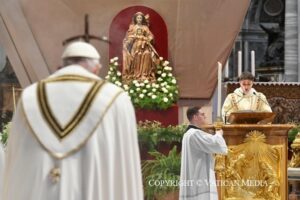 To be sure, dear brothers and sisters, all interior renewal is born of the encounter between our human misery and God’s mercy, and it develops through poverty of spirit, which allows the Holy Spirit to enrich us. Here too, we can think of the clear teaching of many spiritual masters, including, once again, Saint Isaac: “Those who acknowledge their sins… are greater than those who by their prayers raise the dead. Those who weep for an hour over their sins are greater than those who serve the whole world by contemplation… Those who are blessed with self-knowledge are greater than those blessed with the vision of angels”. [9]
To be sure, dear brothers and sisters, all interior renewal is born of the encounter between our human misery and God’s mercy, and it develops through poverty of spirit, which allows the Holy Spirit to enrich us. Here too, we can think of the clear teaching of many spiritual masters, including, once again, Saint Isaac: “Those who acknowledge their sins… are greater than those who by their prayers raise the dead. Those who weep for an hour over their sins are greater than those who serve the whole world by contemplation… Those who are blessed with self-knowledge are greater than those blessed with the vision of angels”. [9]
Brother priests, let us look to ourselves and ask ourselves what part compunction and tears play in our examination of conscience and our prayers. Let us ask whether, with the years that pass, our tears increase. In nature, the older we become, the less we weep. In the life of the spirit, however, we are asked to become like children (cf. Mt 18:3): if we fail to weep, we regress and grow old within, whereas those whose prayer becomes simpler and deeper, grounded in adoration and wonder in the presence of God, grow and mature. They become less attached to themselves and more attached to Christ. Made poor in spirit, they draw closer to the poor, those who are most dear to God. As Saint Francis of Assisi wrote in his testament, those whom we used to keep at a distance now become our dear companions. [10] So it is that those who feel compunction of heart increasingly feel themselves brothers and sisters to all the sinners of the world, setting aside airs of superiority and harsh judgments, and filled with a burning desire to show love and make reparation.
Dear brothers, another aspect of compunction is solidarity. A heart that is docile, liberated by the spirit of the Beatitudes, becomes naturally prone to practice compunction towards others. Rather than feeling anger and scandal at the failings of our brothers and sisters, it weeps for their sins. There occurs a sort of reversal, where the natural tendency to be indulgent with ourselves and inflexible with others is overturned and, by God’s grace, we become strict with ourselves and merciful towards others. The Lord seeks, above all in those consecrated to him, men and women who bewail the sins of the Church and the world, and become intercessors on behalf of all. How many heroic witnesses in the Church have shown us this way! We think of the monks of the desert, in East and West; the constant intercession, in groaning and tears, of Saint Gregory of Narek; the Franciscan offering for unrequited Love; and those many priests who, like the Curé of Ars, lived lives of penance for the salvation of others. Dear brothers, this is not poetry, but priesthood!
 Dear brother priests, from us, his shepherds, the Lord desires not harshness but love, and tears for those who have strayed. If our hearts feel compunction, the difficult situations, the sufferings and the lack of faith that we encounter daily will make us respond not with condemnation, but with perseverance and mercy. How greatly we need to be set free from harshness and recrimination, selfishness and ambition, rigidity and frustration, in order to entrust ourselves completely to God, and to find in him the calm that shields us from the storms raging all around us! Let us pray, intercede and shed tears for others; in this way, we will allow the Lord to work his miracles. And let us not fear, for he will surely surprise us!
Dear brother priests, from us, his shepherds, the Lord desires not harshness but love, and tears for those who have strayed. If our hearts feel compunction, the difficult situations, the sufferings and the lack of faith that we encounter daily will make us respond not with condemnation, but with perseverance and mercy. How greatly we need to be set free from harshness and recrimination, selfishness and ambition, rigidity and frustration, in order to entrust ourselves completely to God, and to find in him the calm that shields us from the storms raging all around us! Let us pray, intercede and shed tears for others; in this way, we will allow the Lord to work his miracles. And let us not fear, for he will surely surprise us!
Our ministry will help in this. Today, in our secular societies, we run the risk of being hyperactive and at the same time feeling inadequate, with the result that we lose enthusiasm and are tempted to “pull up the oars”, to take refuge in complaining and we forget that God is infinitely greater than all our problems. When that happens, we become bitter and prickly, always badmouthing and complaining about things. Whereas if bitterness and compunction are directed not to the world but to our own hearts, the Lord will not fail to visit us and raise us up. That is exactly what the Imitation of Christ tells us to do: “Busy yourself not about the affairs of others, and do not become entangled in the business of your superiors. Keep an eye primarily on yourself, and admonish yourself instead of your friends. If you do not enjoy the favour of men, do not let it sadden you; yet consider it a serious matter if you do not conduct yourself as well or as carefully as is becoming”. [11]
Lastly, let me emphasize another essential point: compunction is not so much our work but a grace, and, as such, it must be sought in prayer. Repentance is God’s gift and the work of the Holy Spirit. As an aid to cultivating a spirit of repentance, I would share two bits of advice. First, let us stop looking at our life and our vocation in terms of efficiency and immediate results, and being caught up in present needs and expectations; instead let us view things against the greater horizon of the past and the future. The past, by recalling God’s fidelity – God is faithful –, being mindful of his forgiveness and firmly anchored in his love. The future, by looking to the eternal goal to which we are called, the ultimate purpose of our lives. Broadening our horizons, dear brothers, helps to expand our hearts, to spend time with the Lord and to experience compunction. My second bit of advice follows from the first. Let us rediscover our need to cultivate prayer that is not obligatory and functional, but freely chosen, tranquil and prolonged. Brothers, how is your prayer life? Let us return to adoration. Have you been forgetting to adore the Lord? Let us return to the prayer of the heart. Let us repeat: Jesus, Son of God, have mercy on me, a sinner. Let us sense God’s grandeur even as we contemplate our own sinfulness, and open our hearts to the healing power of his gaze. Then we will rediscover the wisdom of Holy Mother Church in having our prayer always begin in the words of the poor man who cries: God, come to my assistance!
Dear brothers, allow me to conclude by returning to Saint Peter and his tears. The altar we see above his tomb makes us think of how often we priests – who daily say: “Take this, all of you, and eat of it, for this is my Body, which will be given up for you” – have disappointed and grieved the One who loved us so greatly as to make our hands the instruments of his presence. We do well, then, to repeat those prayers we say in silence: “With humble spirit and contrite heart may we be accepted by you, Lord”, and “Wash me, O Lord, from my iniquity and cleanse me from my sin”. Yet in every way, brothers, we are comforted by the certainty spoken of in today’s liturgy: the Lord, consecrated by his anointing (cf. Lk 4:18), came “to bind up the brokenhearted” (Is 61:1). If hearts are broken, surely they can be bound up and healed by Jesus. Thank you, dear priests, for your open and docile hearts. Thank you for all your hard work and your tears. Thank you for bringing the miracle of God’s mercy. Always forgive. Be merciful. Bring God’s mercy to our brothers and sisters in today’s world. Dear priests, may the Lord console you, strengthen you and reward you. Thank you!
__________________________________________________
[1] “The Church possesses water and tears: the waters of Baptism and the tears of Penance (SAINT AMBROSE, Epistula extra collectionem, I, 12).
[2] “For godly grief produces a repentance that leads to salvation and brings now regret, but worldly grief produces death” ( 2 Cor 7:10).
[3] Cf. SAINT JOHN CHRYSOSTOM, De compunctione, I, 10.
[4] Rule, IV, 57.
[5] Ibid., XX, 3.
[6] Cf. De poenitentia, VII, 5.
[7] Ch. XXI.
[8] Ascetical Homilies (III Coll.), XII.
[9] Ascetical Homilies (I coll.), XXXIV (Greek).
[10] Cf. FF 110.
[11] Ch. XXI.
Related

Pope Francis’ Catechesis: The Rich Man. Jesus “Looked at Him with Love”
Exaudi Staff
09 April, 2025
4 min
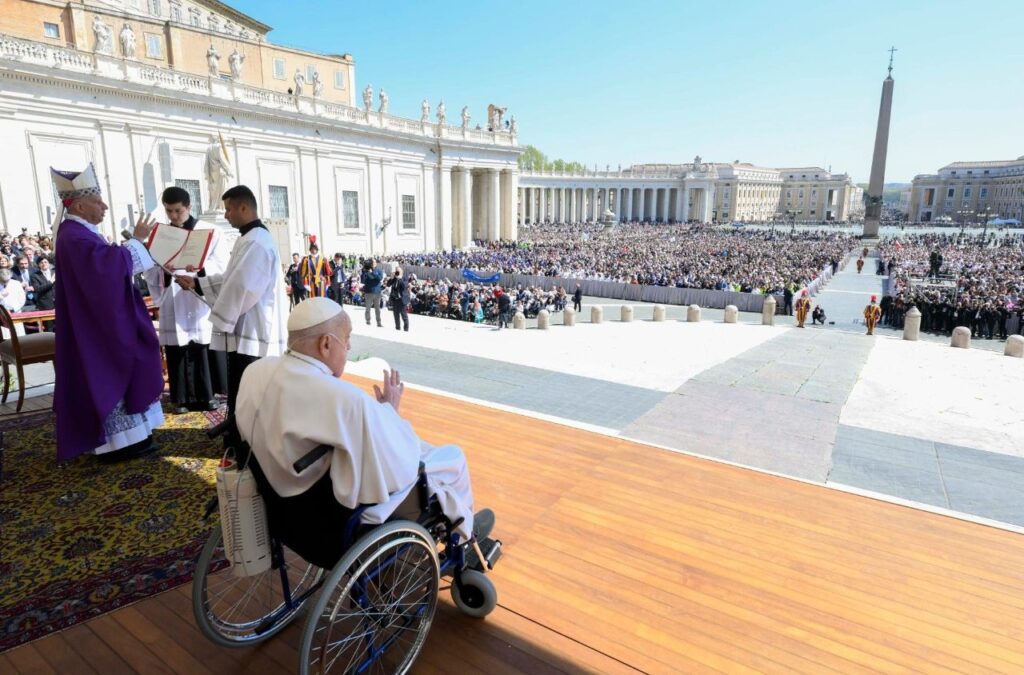
Francis is recovering: progressing progressively
Exaudi Staff
08 April, 2025
2 min
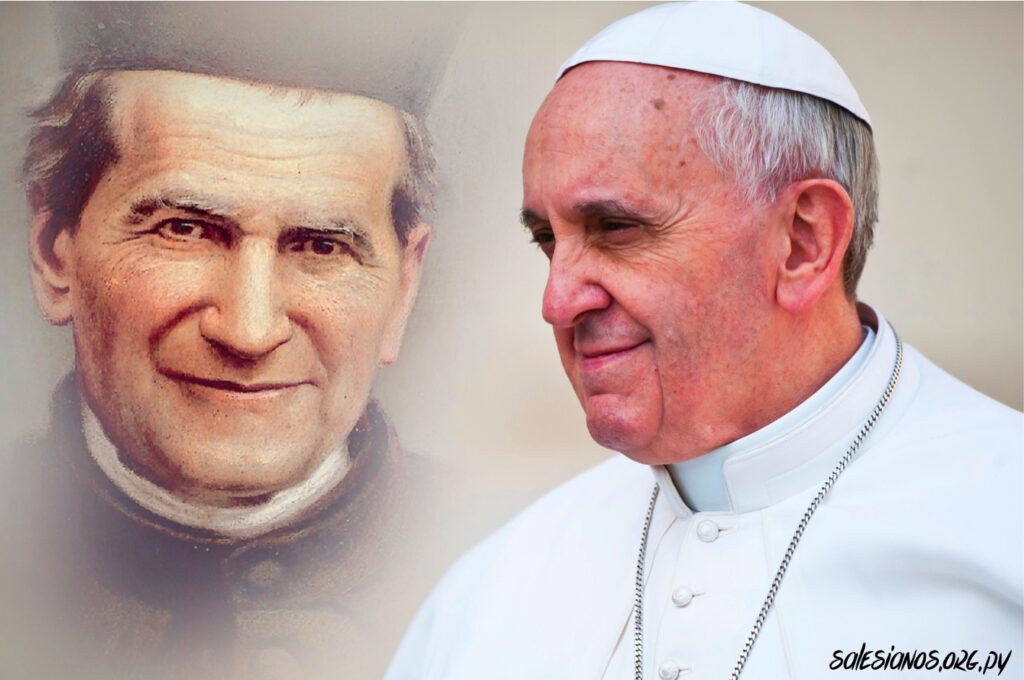
The Pope to the Salesians: “Serve others without holding anything back”
Irene Vargas
07 April, 2025
2 min
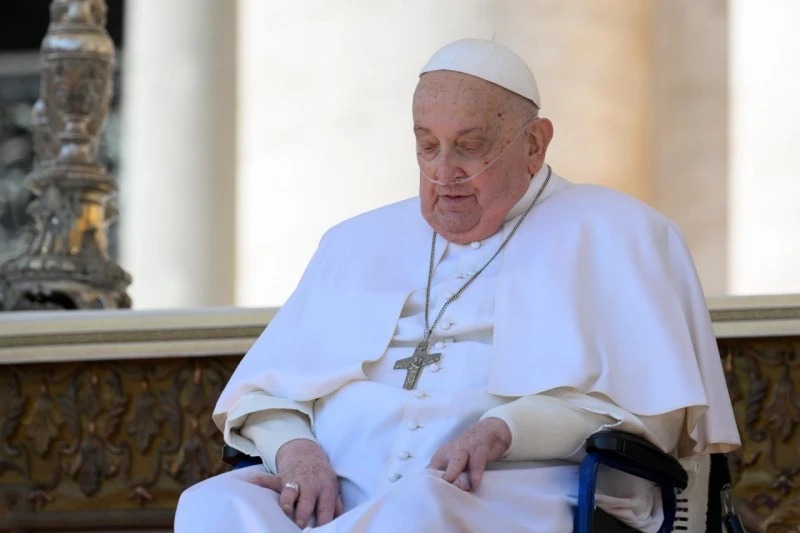
The Pope: In convalescence, I feel the “finger of God” and experience his loving caress
Exaudi Staff
06 April, 2025
2 min
 (EN)
(EN)
 (ES)
(ES)
 (IT)
(IT)

